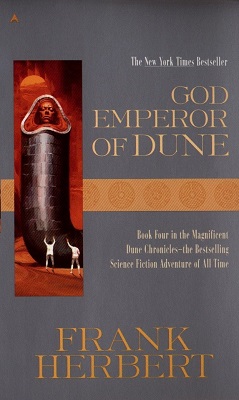God Emperor of Dune (1981)

Author: Frank Herbert
Publisher: Ace
Synopsis:
Leto II has reigned for over three thousand years, guiding humanity toward his vision of the Golden Path, but a descendant of the Atreides plots rebellion against his rule.
Impressions:
One of the striking things about the previous books in the series was the portrayal of prescience and here it's the inhumanity of Leto's current existence. He still has vestiges of his humanity left, but with his prescience, the past lives and his transformation into a creature more sandworm than human, he's a very different beast and his alienness comes through in his interactions with other people. He claims to reject the cult he's built up around himself, but in many ways he's become the mask.
I would've never expected gholas of Duncan Idaho to be a running theme over the past three millennia, but there you have it. Actually, the newly delivered ghola provides a helpful audience surrogate in establishing how much the universe has changed since the previous books and allows a means of bouncing off a lot of Leto's philosophical pretensions. I also like the former rebel turned devoted servant Moneo and the sort of mental blocks he imposes on himself to keep from realizing his potential. Then there is Hwi Noree as a sort of Apple of Discord, bringing out those vestiges of Leto's humanity while jeopardizing his rule, all in a package with utterly no malice in herself (but definitely in her creation and deployment, if you view Leto's rule favorably). In contrast, Siona is the focal point of the conflict yet never feels properly developed. Her grievances against Leto are easy to understand, but for someone to challenge the God Emperor, you would hope for a little more vision to usher in an alternative.
I've commented on the purplish prose in the previous books, but either Herbert's narrative voice had smoothed out at this point or I've just grown reaccustomed to reading him. I couldn't say which for certain. There are some errors in elementary Arabic that even an utter novice like myself picked up, but it's nothing that's going to ruin the overall experience (and I suppose if you want to be charitable, you might argue those errors got baked in somewhere in the past dozen millennia or so).
While I feel this entry wasn't quite as compelling as the previous three, what it does well it does very well, enough for me to still recommend this for a slot in the collection.
Rating:
Own It
